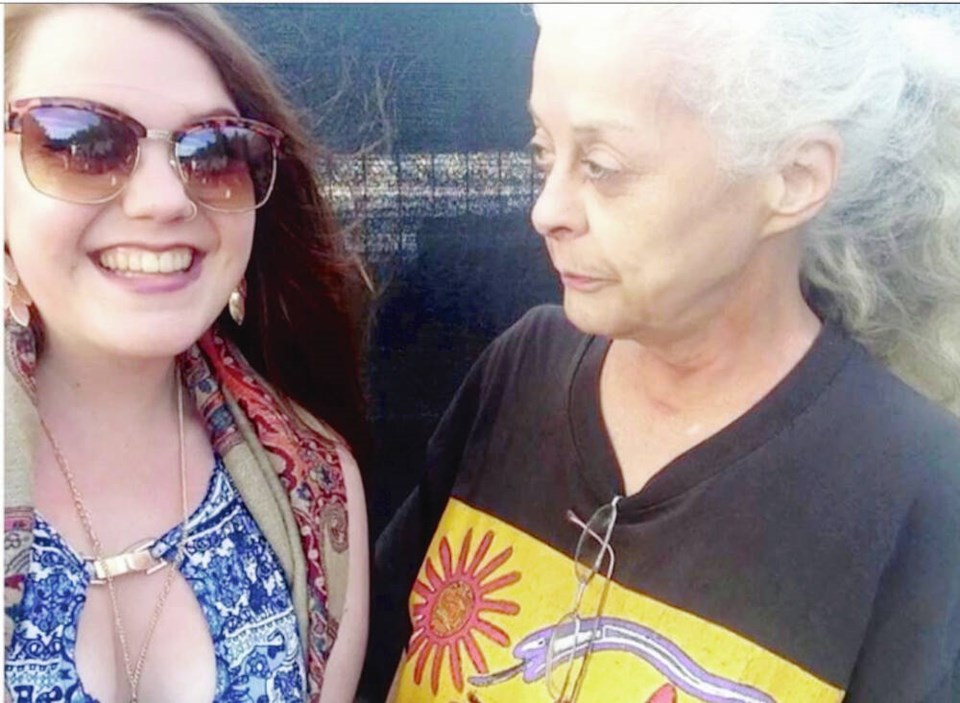Diane Larose Klimek didn’t want any heroic interventions to save her life, but her family believes that when the Saanich woman declined further use of a breathing machine, knowing it would go to a 25-year-old COVID patient, a little heroism did take place.
Klimek died in the respiratory ward at Royal Jubilee Hospital the next morning on Sept. 21.
The 68-year-old retired cook and gardener had been admitted to Royal Jubilee about a week before her death and had a do-not-resuscitate order. She suffered from a variety of health conditions, including chronic inflammatory lung disease or COPD, which makes it hard to breathe and provokes heavy coughing. Always petite, Klimek was critically thin at about 65 pounds.
Daughter Melissa O’Shea said she was told on Sept. 20 by a doctor and nurse that they would have to hunt for a breathing machine for Klimek and were skeptical about whether they could find one.
BiPap is an abbreviation for a bilevel positive airway pressure machine, which provides help with breathing through a mask over the nose and mouth.
“They said they didn’t have a lot of them that were available and they had to see if they could find one because it is the same machine that COVID patients were using,” said O’Shea.
“They were not sure if they would even be able to locate one.”
On this night, a respirologist found one, however, and it was offered to Klimek.
O’Shea and her mother were told that while it wasn’t a life or death situation, there was a young man with COVID in the ICU who could also use it. Klimek was triaged and assessed to be the priority, however.
“It was sort of like, it’s give your mom the machine or give it to this 25-year old in the ICU who uses the same machine. It was this sort of question mark,” said O’Shea.
“They tried it on my mom and she did not want it,” said O’Shea. “That was too much for her.”
Klimek had been ill for years and suffered many losses — her father when she was a child, her ex-husband with whom she remained best friends, and finally her 17-year-old granddaughter Beth, who died of a drug overdose in 2017.
O’Shea said her mom was tired of interventions that weren’t ever going to make her well again. But she also believes strongly that her mother was swayed by the idea that someone younger could make better use of the machine.
“I suspect it was probably both,” said O’Shea.“She would not want anything taken away from somebody else and she was very tired of the struggle.”
Klimek died the next day, with her two daughters and two of her siblings by her side.
Her brother David Larose said wanting the breathing machine to go to another, younger patient would be in keeping with a woman who cared for others, regularly donated blood and wanted to be an organ donor.
“It’s pretty typical of her, you know,” said Larose. “She was a little selfless … a young guy being able to get the machine if she didn’t, that would really speak to her.”
Noticing how busy Royal Jubilee Hospital was in both the emergency department and on the wards, O’Shea and Larose had asked about capacity and were told it was 170 per cent. Over the years, they had been to the hospital many times with their mother and hadn’t see it that busy.
O’Shea said the staff on her mother’s ward were “very generous” with their time and allowed family to visit. “I really can’t say enough about how kind they were.” There was no pressure to vacate the bed, she said, “but it was definitely at a higher capacity than I had ever seen before.”
Larose said a person only has to enter the Jubilee’s emergency department to see the hospital is overwhelmed and behind the doors “it’s bursting at the seams.”
Twenty-eight of 35 critical care beds used for intensive-care, high-acuity and critical-care patients were in use at the hospital on Friday, the Health Ministry said.
There are eight BiPap machines at Royal Jubilee Hospital, and on Friday, all were in use. Victoria General Hospital has six, of which one was in use on Friday. The health authority has 108 ventilators for patients who cannot breathe on their own, of which 38 were in use this week. They can be used to serve the function of a BiPap machine when needed, according to the ministry.
Larose said his sister was one of his best friends, and while she didn’t have an easy life, she enjoyed her work as a cook with Island Health, and her last position as a gardener at Aberdeen Hospital on Hillside Avenue, where she was the first woman to have an outdoor maintenance job — something of which she was proud, he said.
“She loved that because then she could be outside with her Walkman on and listen to tunes,” he said.
The siblings love music and travelled to many festivals around the U.S. and Canada.
“And she never missed Blue Rodeo when they came to town.”



